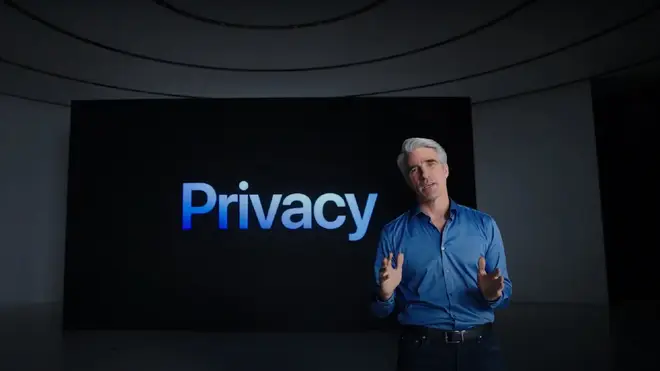
Henry Riley 10pm - 1am
15 June 2021, 07:34

Craig Federighi said the iPhone maker wanted to offer control and transparency to its users through its growing list of privacy features.
Apple’s expanding array of privacy controls is about ensuring everyone is able to control their data “without themselves being a privacy expert”, Apple’s head of software engineering has said.
Last week, the tech giant previewed a number of new privacy tools coming to the next versions of software that power the iPhone, iPad and Mac computers, including ways to reduce online tracking and other online data collection.
As part of iOS and iPadOS 15, which will be publicly released in the autumn, Apple users will be given the power to hide their IP address and location from being gathered by unsolicited marketing emails in Apple’s Mail app, while a feature called Private Relay in web browser Safari will allow users to hide the sites they visit from third-party advertisers.
A new privacy report feature for apps will also show users how different apps on their device are using the data they gather from them.
“This approach is about transparency and control for users,” Apple’s senior vice president for software engineering, Craig Federighi said.
“In practice, our North Star is around the customer and what we think they value and making sure that at the very least we’re giving them visibility and choice,” he told the PA news agency.
“It’s all absolutely in the service of transparency and shining this light on privacy protections.
“We think it leads to the cleaning up of those practices and ultimately a better experience for our customers.”
Apple released a number of privacy-based features in recent months, including requiring app developers to disclose what data they gather from users and introducing a new feature that requires them to ask for express permission to track users outside of their app.
Many of the tools have previously been hailed by privacy experts.
Mr Federighi said many of the privacy tools were designed to give peace of mind to people without any expertise in online data collection and how to best prevent it.
Pointing to the Private Relay tool, Mr Federighi told PA: “We certainly know that when you access a website for instance, you have a base presumption of anonymity, if you didn’t log in, if you didn’t provide any identity information.
“But the fact is that your IP address, as an implementation detail of how the internet works, has been conveying more about you than you might have imagined, potentially providing an identifier that is consistent across multiple visits, conceivably revealing your location in ways that can reveal your identity. And we think that this doesn’t meet with users’ expectations or users’ desires.
“So we wanted to provide a tool that could bring the reality closer to what the user, I think, thought that they may have been dealing with all along, which was a degree of control over whether they were revealing their location and identity to the to the websites they were visiting, and Private Relay provides that.
“But it also provides it with an innovative architecture that allows that to exist without creating an entity in the middle, that now is privileged with a dangerous amount of centralised information.”
He also dismissed suggestions that such tools would put Apple at odds with the advertising industry and those which relied on data collection as part of their revenue stream, arguing that previous updates – the company first introduced anti-tracking tools in 2017 – had not disrupted the industry.
“In practice, we think that the industry at large can innovate and adapt to a changed landscape around privacy protections,” he said.
“We’ve seen cases in the past where we’ve introduced protection and initially, the reaction was ‘oh my gosh, this is the end of everything, the advertising industry is doomed’ and so forth.
“And in fact, quite the opposite (is true).
“The industry managed to come up with tools to continue to be effective, while protecting customer privacy and so our point of view that making the right choices, grounded in what makes sense for the users, is going to lead to a world where we can continue to have innovation in all parts of the app economy – where advertising can still be an effective way to support those efforts, but where at the same time privacy is protected.”
And the Apple executive added that if the US firm’s approach sparked others into creating their own tools, that would be “wonderful for everyone” and “we would feel really good about that”.